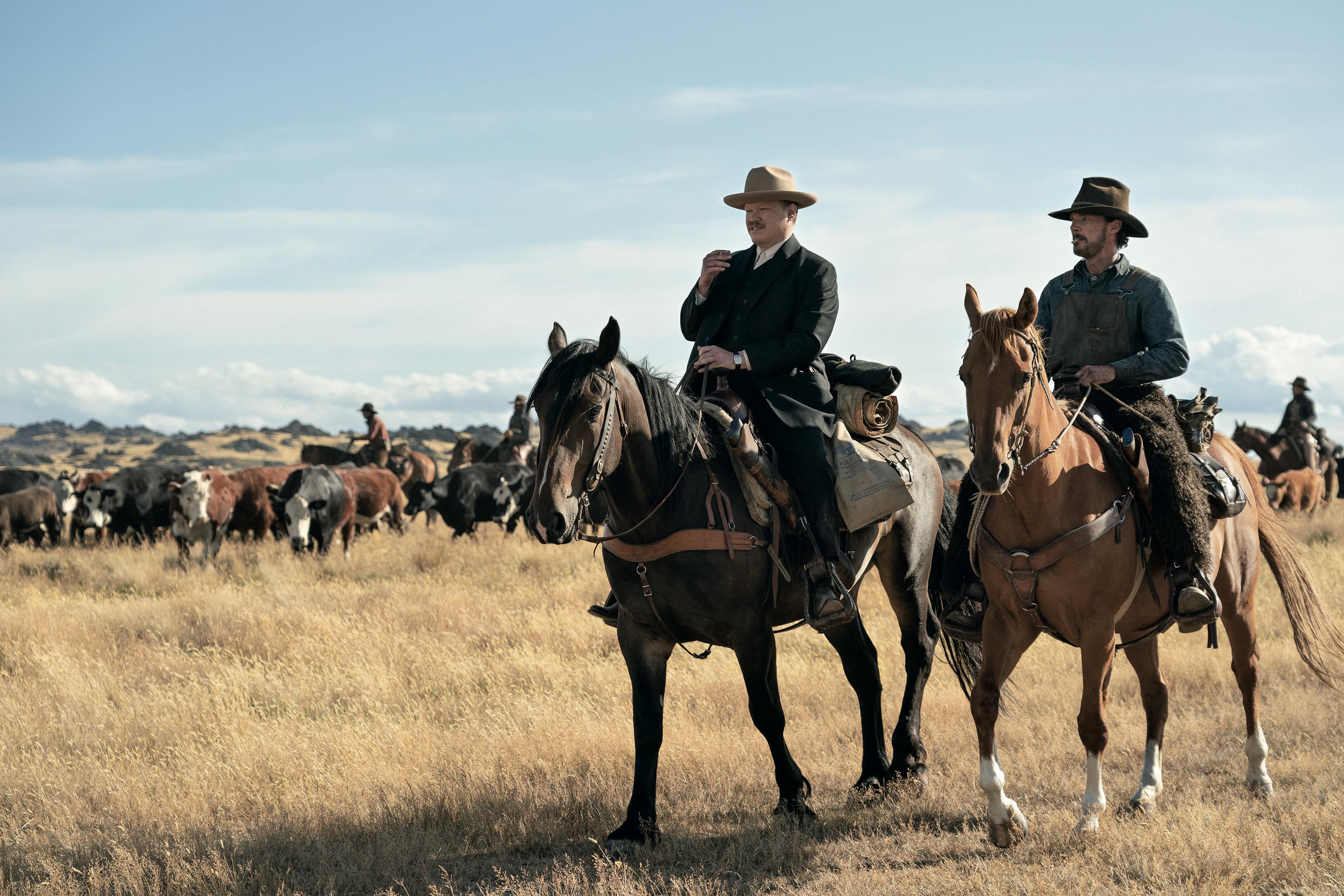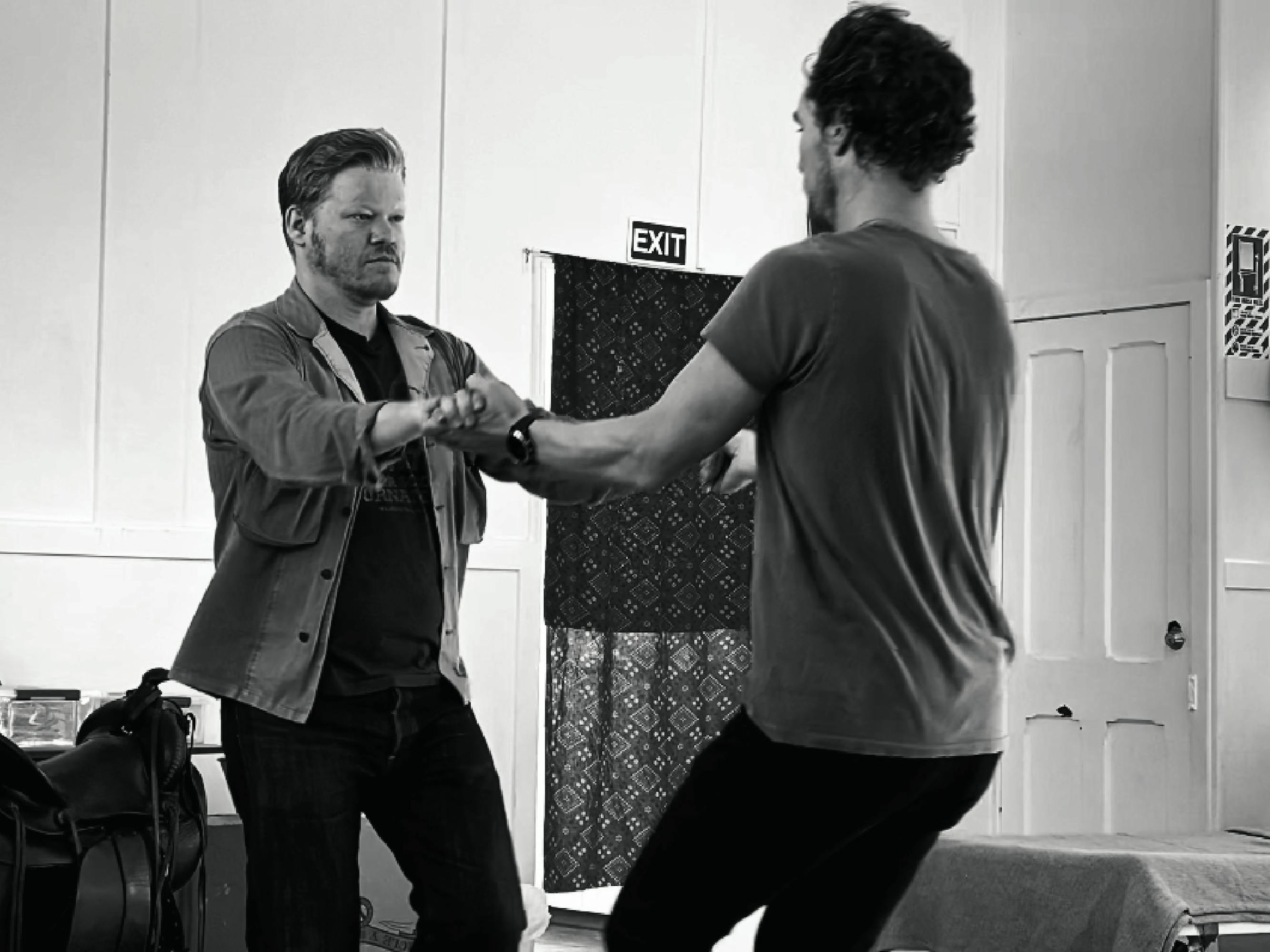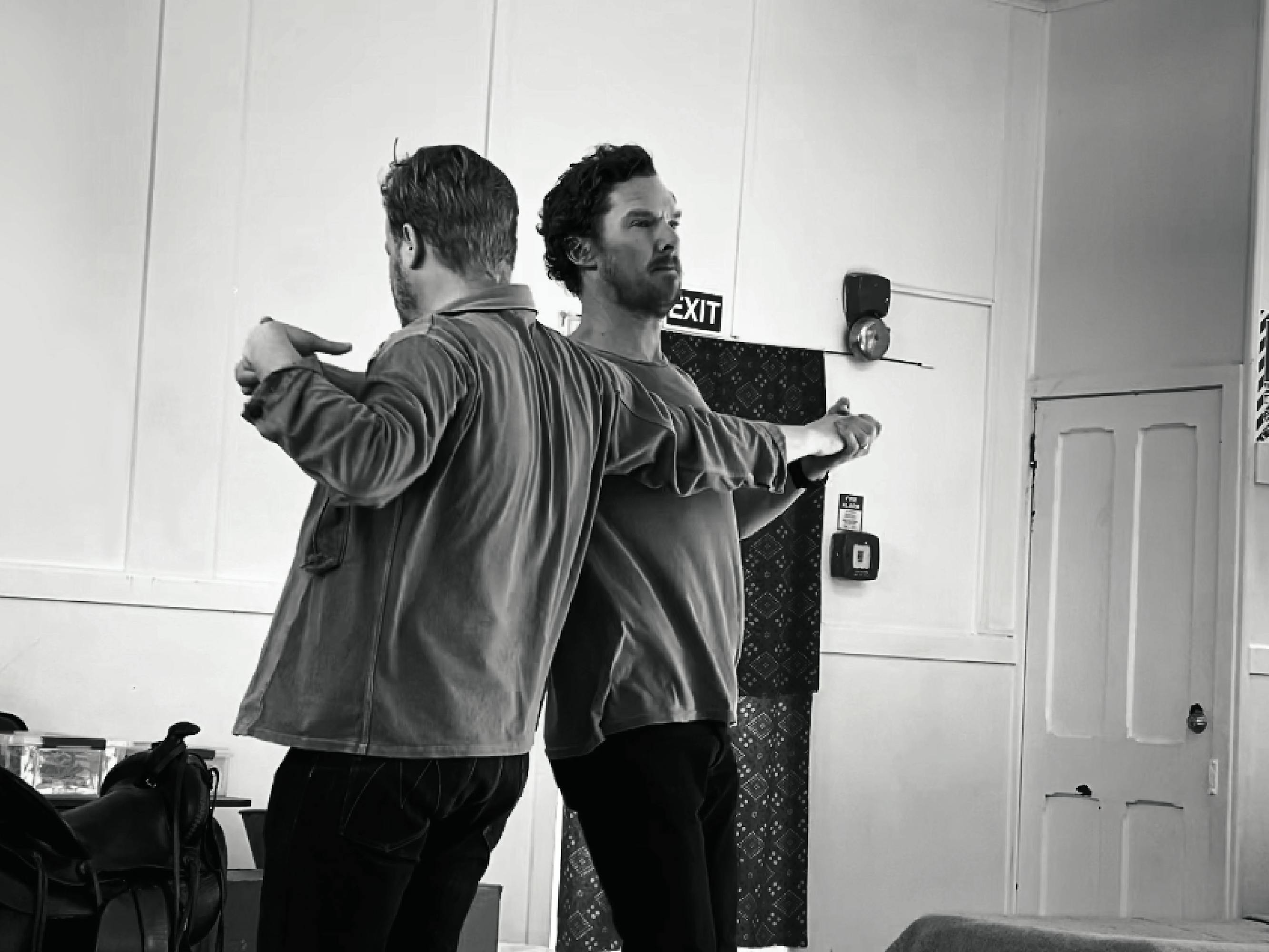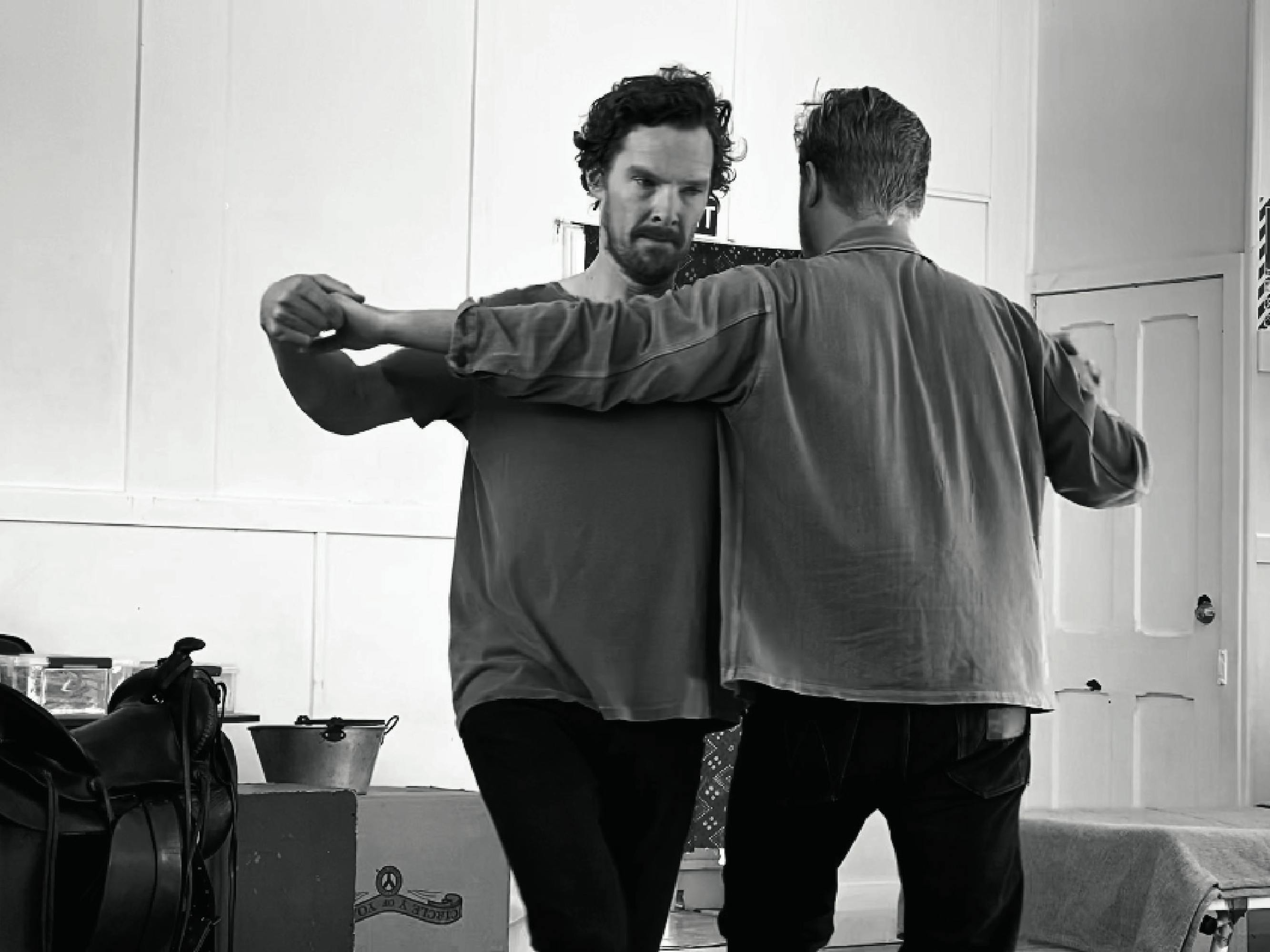The steadfast star explores the depths of loneliness in The Power of the Dog.
One of the great things about a successful partnership is that someone is always close by to stop you from making a terrible mistake. Case in point: When scheduling conflicts threatened to prevent in-demand actor Jesse Plemons from accepting the role of quiet, kindly George Burbank in the 1920s frontier drama The Power of the Dog, Plemons’s fiancée Kirsten Dunst stepped in. “Kirsten was like, ‘It’s Jane Campion. You’re doing this.’” The opportunity to work with the Academy Award-winning New Zealand filmmaker is indeed a rare gift — The Power of the Dog represents Campion’s first feature film since 2009’s Bright Star — but Plemons makes the most of every frame in his pivotal supporting role.
When the film opens, George has lived his life as the ridiculed and silent younger brother to charismatic cattle rancher Phil (Benedict Cumberbatch), who ceaselessly belittles his sweet-natured sibling. After absorbing a lifetime of barbs, George finds a kindred spirit in Dunst’s widow Rose, who operates the Red Mill restaurant to support herself and her teenage son Peter (Kodi Smit-McPhee). They embark on a tentative courtship and soon marry, yet neither can sense the terrible danger facing Rose as she begins a new life under Phil’s roof.
Like Dunst, Plemons began acting as a child, before making his way into audiences’ hearts with his lovable portrayal of Landry Clarke on Friday Night Lights. Widely recognized for his versatile and naturalistic acting style, Plemons quickly began amassing impressive credits in film and television — Breaking Bad, The Master, Bridge of Spies, Vice, The Irishman, I’m Thinking of Ending Things, Judas and the Black Messiah — working with the likes of Steven Spielberg, Martin Scorsese, and Paul Thomas Anderson.
He’s received two Emmy nominations — most recently, for his turn as a disgruntled video game programmer in the 2017 Black Mirror episode “U.S.S. Callister,” and for his work in 2015’s acclaimed second season of anthology series Fargo. It was on the set of that series that he and Dunst first met, playing Ed and Peggy Blumquist, a blue-collar Minnesota couple drawn into dark dealings in their small town.
“We trusted each other very quickly — that’s something that’s hard to come by,” Plemons says. “Some of that’s intangible and hard to explain — why you work well with certain people or why it’s easier with certain people. It’s just like why in life you become fast friends with someone or feel like you know them quickly. We had that on Fargo, and for whatever reason, we’re able to be really honest with each other.”
That rapport served them well as they set out to locate the rhythms of the romance that blossoms between The Power of the Dog’s two loneliest souls. “With George and Rose, you’re seeing a lot of it [develop] in real time, so there isn’t that history,” Plemons says. “There was less to create and more just on the spot, giving into the moment. It was the best of all possible worlds getting to not only work together again, but on a Jane Campion film in New Zealand and bringing our two-year-old son along.”
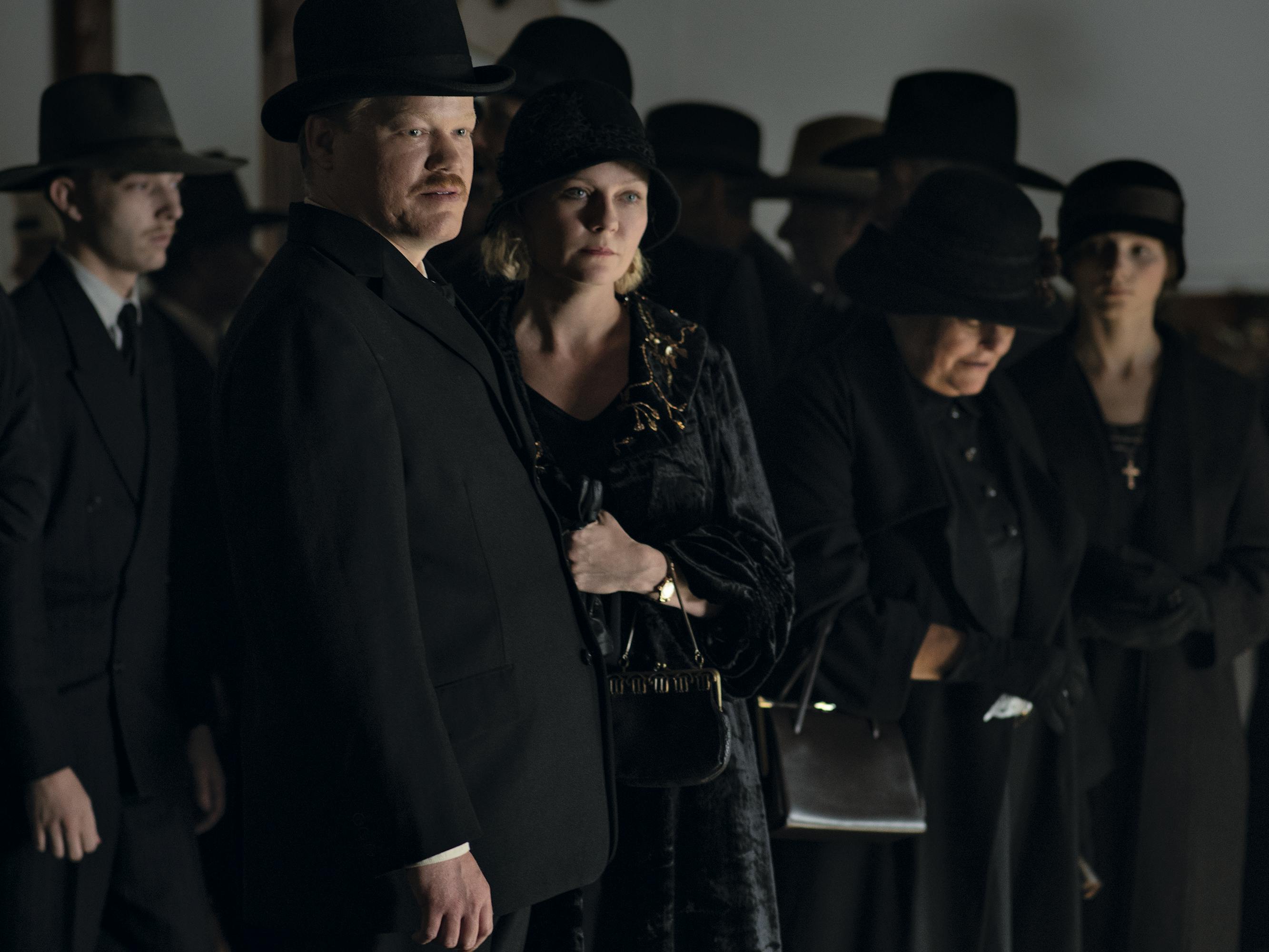
Jesse Plemons and Kirsten Dunst
Krista Smith: What struck you initially in your first meeting with Jane Campion? How did you feel about the character of George?
Jesse Plemons: She has a really funny, specific sense of humor, which I appreciated. Obviously, she’s a master at what she does, but this felt like something slightly different for her, which was exciting. I wasn’t interested in just playing the version of George that is based on what Phil says about him. After I read the book, I realized that the majority of the information that you’re getting is through Phil’s lens. It’s all from this older brother that’s been using George as a punching bag for years. In the book, there’s one scene where George is talking to Rose about his memories of going to the beach on the East Coast with his parents. There was some line like, I dream about it sometimes, and I just knew there had to be something else going on beneath the surface. Jane referenced Robert Duvall — who’s one of my favorite actors — in The Godfather, this quiet power and dignity. That was exciting to me, that she was already thinking about it in that way.
What was it like to rehearse this film for Jane Campion?
JP: The first rehearsal day, she brought on this movement specialist to be there for all of us, to answer any questions we had about the physicality of any of our characters. But [with Benedict], our first day of rehearsal was a brothers’ waltz to an Elliott Smith song. It was very strange. I’ve taken a handful of classes, and any time you’re uncomfortable, that’s usually a good thing, you know? So, it was, I think, a brilliant way to start. It’s so easy, especially early on, with something as rich as this story, to come at it from an intellectual standpoint. But this was a way of getting us to immediately relate to each other on a different level. She wanted him to lead and for me to follow. It felt like a shortcut into our dynamic. Then we got into discussing their history and doing different improvisations and whatnot. It makes a difference on the first day of shooting when you feel like you’ve already walked around in their shoes for a while.
There’s an acute loneliness that runs through all these characters, but there is also a loneliness to the West and this particular time. The automobile is coming in. The old way of life is leaving. It’s this interesting point of change.
JP: One of the things that Jane and I talked about in our first meeting was this critical time and what it means to be a cowboy, that whole mythology and persona. Growing up in Texas in a family where my dad roped and rode horses, I rode from a very young age and went to rodeos and all that. Larry McMurtry has this great book of essays called In a Narrow Grave. It’s about that exact thing. He’s driving around Texas exploring what it means to be a cowboy now that there’s this pull from all these rural areas to these larger cities and the horse is being replaced by the car. There’s the whole mystique around the cowboy itself. There’s a pride in the loneliness. It’s a badge or something.
You grew up in small town, rural Texas, playing football. How did you discover acting? Because you’ve been at this for a very long time.
JP: Well, the beginning was really a fluke. Similar to Kirsten, actually, our moms were like, Isn’t our kid cute? She took me to an open call for a commercial when I was two and a half, and I got it. For a while, as a fun family outing, we would go be extras in whatever was filming in the area. The older I got, the more intrigued I was by not only playing make-believe, but the circus environment of a set and the different types of people that you meet. Coming from my town of 2,000, which I loved and love going back home to, it was like getting a peek into a different world. I was an extra in a few Westerns, and it felt like stepping into that world. There was just some pull there that I would’ve come to eventually anyway, but I feel grateful that I knew it was an option at a young age.
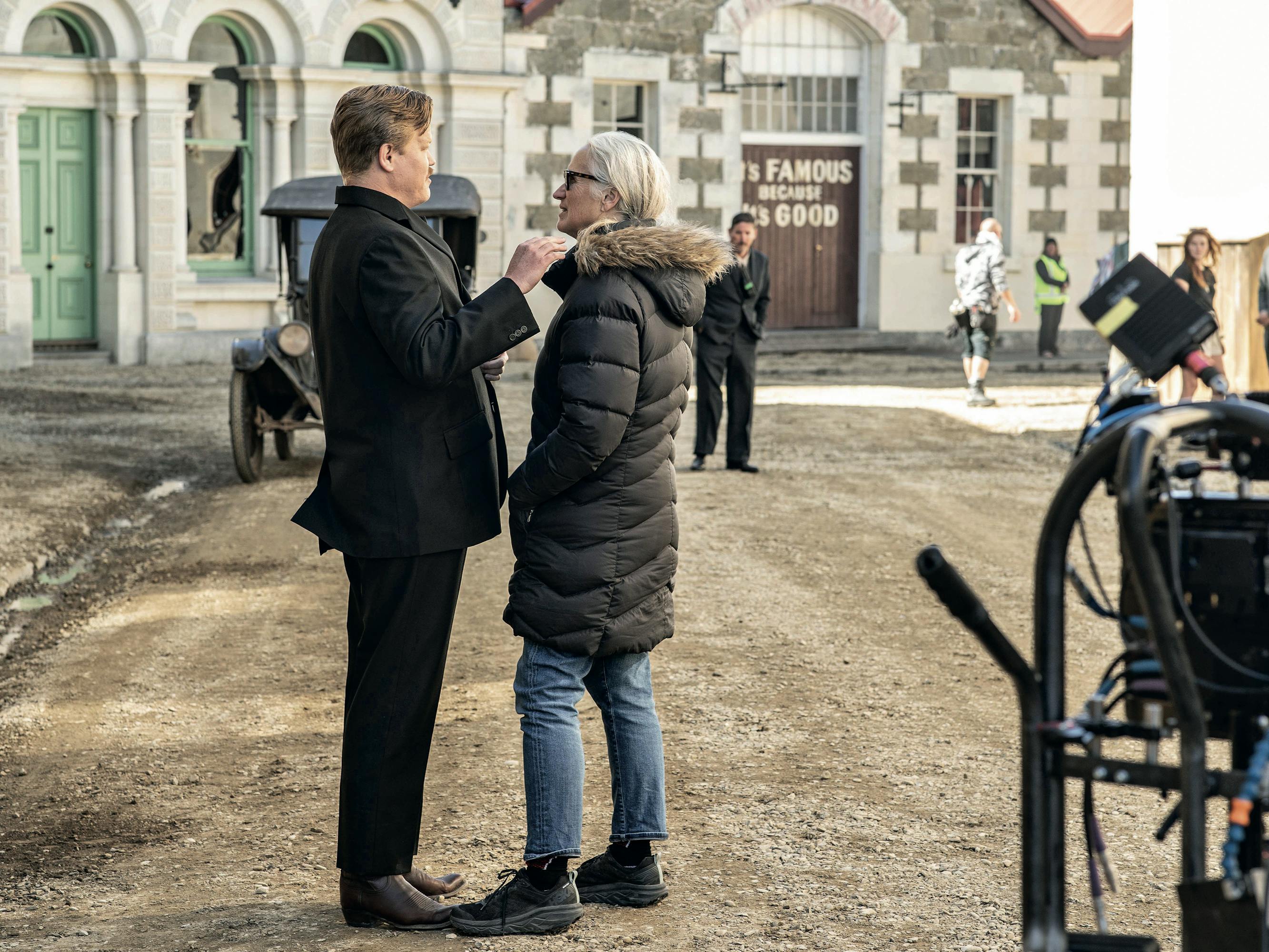
Jesse Plemons and Jane Campion
What I love is that you’ve always been Jesse Plemons, this low-key actor that comes in and gives the audience a gut punch. You didn’t go through a cute Disney phase or any of that.
JP: Even if I wanted to, it would not have worked. I auditioned for those Disney things, but I did not get them.
Let’s talk about what you have done. Friday Night Lights was huge. Fargo, Breaking Bad. You’ve worked with Robert De Niro, Al Pacino, Amy Adams, and Philip Seymour Hoffman. It’s just an incredible resumé. Then here we are with Jane Campion. What did you learn about your craft or even yourself from these colleagues along the way? Do you take something away from those experiences every time?
JP: For sure. That’s the most exciting aspect of it. When I was younger and more into sports, I loved playing with older kids because they’re better, and that’s how that’s how you learn. With all great directors in my experience, there’s an unflinching devotion to the story and the characters, a constant pursuit of never being satisfied. It’s no coincidence that on these films, there are some of the best actors, and production designers. Every great director, they’re using every piece of the puzzle to build up and tell the story. Getting an actual scene with De Niro was one of the personal stand-out moments of my career. This constant push and pull between the preparation, making sure you know the character, but then the willingness to sink into the moment and not get stuck in something intellectual — always what I’m most excited by are these found moments that come out of putting together all these brilliant people.
